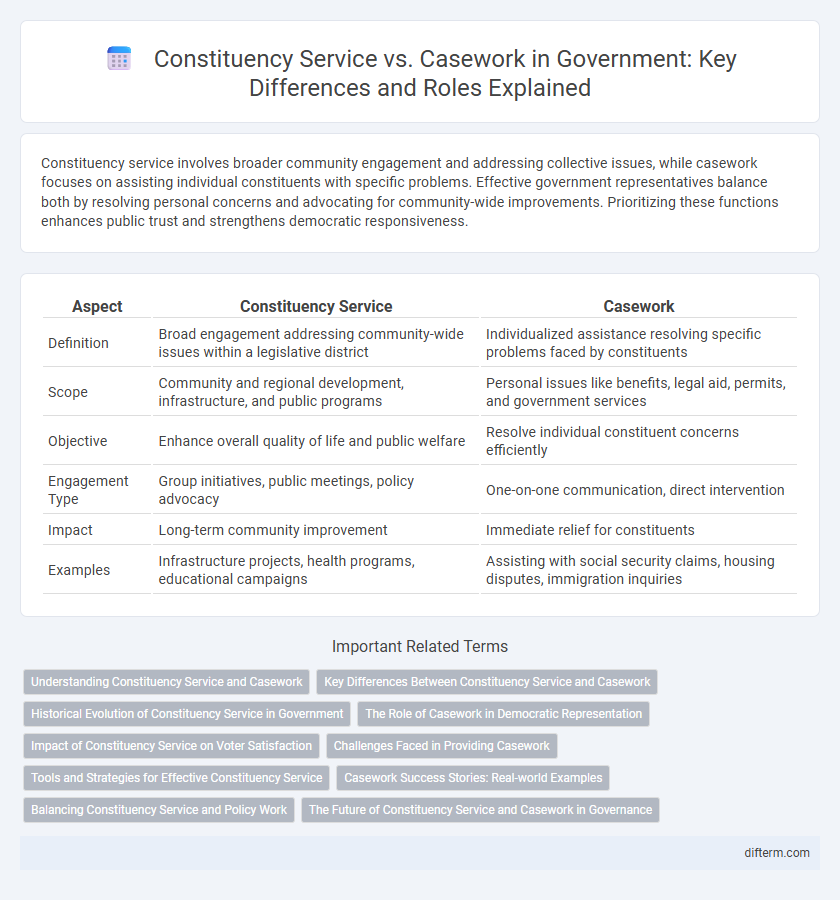Constituency service involves broader community engagement and addressing collective issues, while casework focuses on assisting individual constituents with specific problems. Effective government representatives balance both by resolving personal concerns and advocating for community-wide improvements. Prioritizing these functions enhances public trust and strengthens democratic responsiveness.
Table of Comparison
| Aspect | Constituency Service | Casework |
|---|---|---|
| Definition | Broad engagement addressing community-wide issues within a legislative district | Individualized assistance resolving specific problems faced by constituents |
| Scope | Community and regional development, infrastructure, and public programs | Personal issues like benefits, legal aid, permits, and government services |
| Objective | Enhance overall quality of life and public welfare | Resolve individual constituent concerns efficiently |
| Engagement Type | Group initiatives, public meetings, policy advocacy | One-on-one communication, direct intervention |
| Impact | Long-term community improvement | Immediate relief for constituents |
| Examples | Infrastructure projects, health programs, educational campaigns | Assisting with social security claims, housing disputes, immigration inquiries |
Understanding Constituency Service and Casework
Constituency service involves elected officials addressing the broad needs and concerns of their entire electoral district, including community projects and policy advocacy, while casework focuses on assisting individual constituents with specific problems, such as navigating government agencies or accessing social services. Effective constituency service strengthens public trust and promotes civic engagement by responding to local priorities and facilitating communication between citizens and government institutions. Casework enhances personalized support, resolving constituent issues through direct intervention and tailored problem-solving within bureaucratic frameworks.
Key Differences Between Constituency Service and Casework
Constituency service involves broad efforts by elected officials to address community-wide issues and improve local infrastructure, while casework focuses on assisting individual constituents with specific problems such as navigating government bureaucracy or accessing public benefits. Constituency service aims to foster overall community well-being and political support, contrasting with casework's personalized support and resolution of individual grievances. Both functions require distinct strategies, with constituency service demanding strategic planning and public engagement, whereas casework emphasizes responsiveness and detailed problem-solving.
Historical Evolution of Constituency Service in Government
Constituency service in government has evolved significantly from ad hoc casework practices to a structured system addressing constituents' needs through legislative and administrative support. Early representatives primarily focused on individual casework, resolving personal issues related to government agencies, but over time, this service expanded to include broader community engagement and policy advocacy. The historical shift underscores the growing recognition of constituency service as a vital component of democratic governance and political accountability.
The Role of Casework in Democratic Representation
Casework serves as a critical mechanism in democratic representation by directly addressing individual constituents' concerns and facilitating access to government resources. Effective casework strengthens trust between elected officials and their communities, enhancing accountability and responsiveness. Legislators leveraging casework demonstrate commitment to constituent needs, reinforcing the democratic process through personalized problem-solving.
Impact of Constituency Service on Voter Satisfaction
Constituency service significantly enhances voter satisfaction by addressing local concerns directly and fostering a sense of representation and trust between elected officials and their constituents. Unlike casework, which involves solving specific individual problems, constituency service encompasses broader community engagement and resource allocation that can improve public perception and political support. Research indicates that effective constituency service correlates with higher voter turnout and increased loyalty during elections.
Challenges Faced in Providing Casework
Providing effective casework in constituency service faces challenges such as limited staff capacity, high volumes of requests, and navigating complex bureaucratic systems. Constituency offices often struggle with inadequate resources to address diverse and time-sensitive individual issues efficiently. Ensuring timely communication and managing constituent expectations remain critical obstacles in delivering responsive casework assistance.
Tools and Strategies for Effective Constituency Service
Effective constituency service leverages digital platforms and data analytics to track and address constituent concerns promptly, enhancing responsiveness. Collaborative tools like CRM systems enable government representatives to manage casework systematically, ensuring transparency and efficient communication. Strategic use of social media and community outreach programs fosters trust and engagement, streamlining issue resolution within local constituencies.
Casework Success Stories: Real-world Examples
Casework success stories highlight government officials effectively resolving individual constituents' problems, such as expediting social security benefits or facilitating veteran's healthcare access. These real-world examples demonstrate the impactful role of personalized assistance in addressing specific community needs and improving public trust. Detailed records from local government offices reveal consistent casework outcomes that strengthen the bond between elected representatives and their constituents.
Balancing Constituency Service and Policy Work
Balancing constituency service and policy work is crucial for effective government representation, as constituency service addresses individual voter concerns, enhancing trust and voter satisfaction. Casework involves resolving specific problems such as social security issues or local infrastructure needs, while policy work focuses on creating legislation that benefits the broader population. Prioritizing both ensures elected officials maintain responsiveness to immediate needs without neglecting long-term legislative goals.
The Future of Constituency Service and Casework in Governance
Emerging technologies such as artificial intelligence and big data analytics are transforming constituency service and casework by enabling faster, more personalized responses to citizens' needs. Governments are increasingly integrating digital platforms to streamline communication, improve transparency, and enhance service delivery efficiency at the local level. Future governance models emphasize proactive engagement and data-driven decision-making to better address community concerns and improve public trust.
constituency service vs casework Infographic

 difterm.com
difterm.com